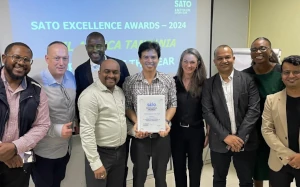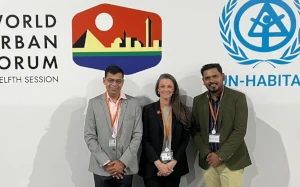
Erin McCusker, Leader of social enterprise SATO, says COVID-19 has elevated understanding of hygiene and sanitation but too many still lack the products and amenities to match their desire for a healthier life.
They say it takes 21 days to make a habit, and almost 90 days to make it automatic. It’s been two years since we were all told to wash our hands regularly, but are we guaranteed this life-saving behaviour change will stick?
Covid-19 has accelerated more than ten years of behaviour change in hygiene and sanitation. Concerted efforts by governments, non-governmental organisations, and businesses to increase awareness of handwashing and improve access to facilities globally has aimed to prevent illness and spread. However, this is just the first step.
With populations engaged and global interest mobilised, a window exists to convert increased demand for handwashing and safely-managed sanitation into long-term changes in behaviour and levels of access. The challenge is expanding and maintaining that access to products and amenities that match aspirations for a healthier life well after the pandemic.
Access to hygiene and sanitation remains challenging for billions around the world. One-in-three people are unable to wash their hands with soap at home, while 60% live without a safe toilet. In the least developed countries, seven-in-ten schools have no handwashing facilities and more than half lacked basic sanitation.
From an economic perspective, poor hygiene and sanitation costs the poorest countries up to 5 per cent of annual GDP, despite the fact just $1 of investment in these areas delivers $5.50 in returns for society.
Although the scale of the hygiene and sanitation challenge is daunting, change starts small. It is as simple as making sure a family has a tap and soap next to where they go to the toilet or prepare food.
Coordination is critical. In communities with no history of toilet use or handwashing, the behaviour change seen during the pandemic can only become a part of people’s routines if their access is seamlessly integrated. If you are just learning about the benefits of handwashing and need to leave your home to get from toilet to tap, there is a good chance you will not bother. We must meet people where they are.
Governments, NGOs, and businesses need to work in concert, aligning strategies for infrastructure, amenities, and products. Significant resources are being deployed in the poorest communities to improve access to water, hygiene, and safe sanitation. However, funders and partner organizations are often forced to rely on existing products and solutions that are not necessarily tailored to specific needs.
By collaborating with the private sector to leverage its capacity for investment and innovation, new products can be developed that respond directly to feedback from communities.
For example, UNICEF recently worked with SATO, a social enterprise specialising in affordable hygiene and sanitation, during the creation of a new handwashing solution for use off grid. UNICEF fed insights from working on the ground in over 100 countries into SATO’s market intelligence and prototypes, supporting a design that prioritises water efficiency, simplicity, and affordability. The result was a portable handwashing station that reuses plastic drinks bottles for the reservoir and requires as little as 100ml per wash.
Young people from local communities were also employed to survey their neighbours using their mobiles and feedback experiences of the new tap. This kind of integration with expert organisations and local people is a win-win, enabling businesses to deliver products that people are more likely to buy precisely because they meet their specific demands.
Supplying amenities will not be enough, however, without soap and cleaning product providers making their ranges affordable and accessible. Dialogue is needed between companies like SATO, which develop and sell the taps and toilets, and fast-moving consumer goods businesses to ensure their products are available together for consumers in emerging markets.
Global change will also require impetus from beyond the water, sanitation, and hygiene sector. Illnesses like diarrhoea are already a drain on productivity in international supply chains and the situation is set to become even more difficult. CDP forecasts $301 billion of business value is exposed to water risks as demand increases and the effects of climate change become more severe. Companies that fail to get ahead and help communities close to their factories and suppliers secure water efficient, affordable hygiene, run the risk of trading off the water needs of their operations with the health of their employees, the provision of essential local services, and even regional stability.
Everyone has an interest in ending death and disease from poor hygiene and sanitation. Covid-19 showed illness anywhere in the world can become an international challenge, affecting everything from public health to household budgets, government debt to companies’ bottom lines. The next pandemic can be prevented, and millions lifted out of poverty. Access is key and it all begins with a toilet, a tap, and a bar of soap.







